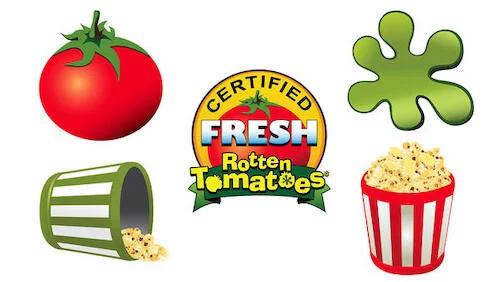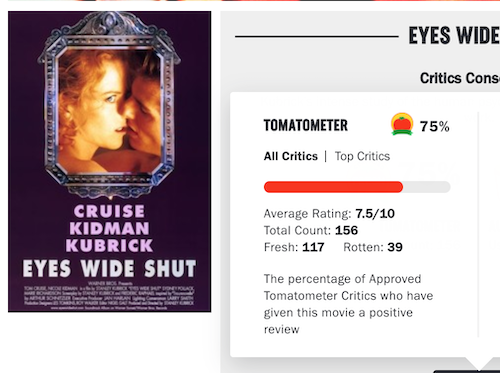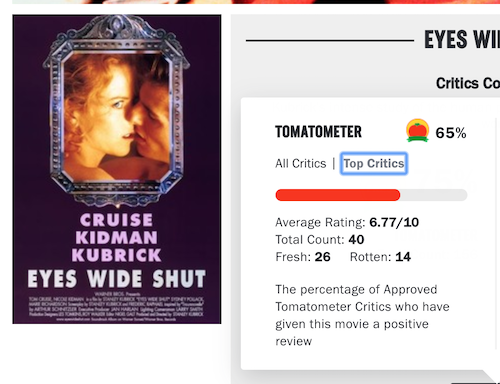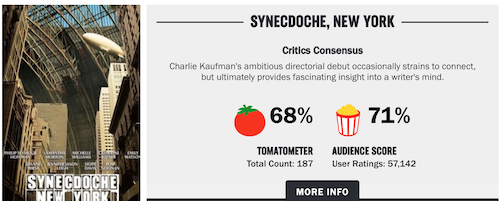The Rotten Problem Over at Rotten Tomatoes
As many of you are aware, review aggregate Rotten Tomatoes has come under fire for a number of reasons this decade: influence on the overall box office market, the ability to chastise unreleased works until preratings were removed (which resulted in a huge backlash from users), and other issues. Considering that the platform is just over twenty years old, we’re still seeing the side effects of a newer method of medium critiquing. We have to live through the experience to discover all of the flaws, since most of these problems can’t be foreseeable. You don’t know how negatively a successful site’s impact can affect an industry until that success has staying power and control.
Well, there is one area of concern I haven’t seen anyone really discuss yet, but it becomes apparent to me more and more every passing day. Rotten Tomatoes specializes in reviews of newly released films, correct? You’re curious about a flick you want to catch, so you head on over to the great R. T. and see what the recent hubbub is. Rotten Tomatoes also allows reviews of older films; you will notice the amounts are usually much more scant, given the many different variables (how many online journals can reflect on newer films, what reviews can be used from many years ago, and more). However, older films’ reviews are there. Just don’t expect the over three hundred reviews the Avengers franchise can accumulate for each film.
With all of this in mind, here is my concern. Look back at the earliest modern reviews found on Rotten Tomatoes. I’m talking the late ‘90s. These films received their ratings, and the current state of their percentages have likely not budged much at all, considering the bulk of these reviews came upon release. We have reached a point in Rotten Tomatoes’ lifetime where films that are getting old enough to be reassessed aren’t being displayed in such a way. Even the wonky IMDb user rating scale has a better reflection of the current state of a film’s legacy (and you know a system is broken when the IMDb user set up is more reliable).
Let’s provide an example so you know what I mean. Eyes Wide Shut has been widely reconsidered to be a powerful final statement by Stanley Kubrick. When released, the reception was much more split. Then again, thus is the case for borderline every Kubrick film post Spartacus. 2001, Barry Lyndon, A Clockwork Orange, and other massive works were given a hard time (outside of the respect for the technical wizardry on these films) when they first came out by the masses. Sure, they got a number of Academy Awards nominations, but none of these films ever took home major wins. Now, the Academy is considerably insane for having never awarded Kubrick for his work. Back to business. Eyes Wide Shut is mostly beloved now. Here is what the bulk of its original reception looks like (keep in mind a small percentage of this rating does come from more recent reviews).
75 out of 100 isn’t too shabby. Plus, there’s that decent 7.5 average rating, which may have been hoisted up by more recent reviews. Let’s look at those Top Critics numbers.
Ouch. That’s much more bland.
Does this depict the current state of Eyes Wide Shut’s legacy? Does it show how it has reached a considerable 336 on They Shoot Horses Don’t They?’s prestigious top 1000 list, amongst many other various best-of lists?
What about a newer modern classic: Synecdoche, New York. Roger Ebert’s best film of the 2000’s. 657th on that same They Shoot Horses Don’t They top 1000 list. Beloved by credible sources like Sight & Sound, and recently given some appreciation by lists by BBC’s pool of critics and other professionals. How does that look here?
Yeesh. One of the 2000’s greatest epics is deemed a work that “strains to connect”. I purposefully left in the audience score this time to make a point. Look. Many acclaimed works don’t get the best audience reception, either because these works are challenging and demanding, or they’re far too unconventional for someone newer to experimental or arthouse leaning works. Considering that, even the audience rating has shown a bit more love than the “tomatometer”, which has placed Synecdoche, New York at a measly 68% on this scale. I can guarantee that this isn’t what the majority of critics are currently thinking about the film.
The same problem can be seen in reverse, where works that haven’t aged particularly well have high ratings because of the splash they made when released. I find this to be less of an issue, given the uniqueness of being able to relive the status of a film’s immediate critical successes at any time, as if it were a time capsule. That doesn’t really hurt Rotten Tomatoes’ modus operandi quite as much. Having renown works not be caught up to speed is a major disservice.
I’m not sure if there is a great solution. It’s too much work to get every critic approved to be on the site to rewrite a review of these older films unless they plan on writing these articles themselves. There’s the adjusted tomatometer (used usually when comparing newer and older films), but that doesn’t really help this particular predicament at all (it’s only a quick fix for comparing Best Picture winners or other themed lists at once). What I do know is that this proves that, in yet another way, the Rotten Tomatoes system, while well intentioned, is massively flawed. We are only going to keep moving forward, and Rotten Tomatoes’ reflection on recent history is only going to get more and more skewed.
I’ve brought up a few publications and their Best Of lists, and the good news here is that these lists can be updated at any time. Rotten Tomatoes can’t. You can’t just ask hundreds of critics to take part in re-observing works that are given more love now than they did before. It’s insane. I shouldn’t even be one of the first people to be acknowledging this on some sort of public level. The beauty of film history is that it is forever flowing. Overlooked artists are discovered and championed. The passage of time reveals “terribly” made works as actual innovations to the craft. Hysteria dies down, and we can view certain popular works with the proper perspective they deserve. Rotten Tomatoes isn’t currently equipped to handle any of that, when it comes to works from the past twenty five years or so.
As sad as it makes me to admit, the ‘90s weren’t yesterday, and that era is old enough that music from that time is considered “classic” on various radio stations. It’s about time someone brought up this oversight when it comes to Rotten Tomatoes, because I honestly think it’s far worse than the other bones people have had to pick with the platform over the years. How is this preserving film history properly in any way? Capsules do not equate to being reflections.
Andreas Babiolakis has a Masters degree in Film and Photography Preservation and Collections Management from Ryerson University, as well as a Bachelors degree in Cinema Studies from York University. His favourite times of year are the Criterion Collection flash sales and the annual Toronto International Film Festival.





